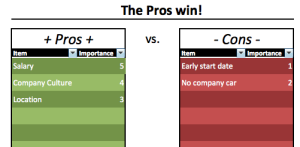Did you just receive a job offer? If you know how to negotiate a higher salary, you could earn up to $10,000 or more in your first year.
Yes, that’s the truth. Those who know the ins and outs at the negotiation table are able to pick up thousands of dollars in “free money.” And usually it’s far easier than you imagine.
Because here’s the thing. After you have a job offer, I’ve never heard of an organization taking it away because someone respectfully asked for more money. Never, ever, ever.
Hiring managers put a lot of time and money into recruiting you, so they’re invested in bringing you on board their company. Plus, the obvious fact that they offered you the job proves they want you—duh!
What does all of this mean? You have the leverage and the negotiations are tilt in your favor.
And besides the immediate money gained with a salary increase, your starting salary also influences how much you’re paid throughout your career. This could mean the difference in millions of dollars in total earnings if you get all of what you’re worth.
So speak up to negotiate your salary and use this situation to your advantage. Don’t immediately take the first salary offered to you.
At the very least, test the waters and see if there is any wiggle room to work with. While you (still) can, play hard to get!
How do I know all of this? I personally received $10,000 more than the initial salary offered when I negotiated my salary for my first job out of college. And I saw what a difference it made with each paycheck.
So use these key insights and you’ll be far better off than taking the first salary offered to you. (These same methods also work as a current employee when you’re negotiating your salary or a raise.)
How To Negotiate A Higher Salary
Step 1 – Know the salary you want, and what range you’ll accept.
Before you do any negotiation, the first move is to find your market value—the median salary of this position for someone of your skill level and experience. There’s two ways to do this, use both of them.
First, go on Glassdoor.com to type in the position title and location (location is important because different cities have different costs of living).
Another way to find your market value is to talk to friends in a similar position and/or who live in the city where your job might be. Ask them how much they’re making.
When you’re finished with this step, you’ll have answered these three questions.
- What’s the market value salary for your position and location?
- What’s the minimum salary you would accept?
- What’s a salary you would be pumped to get?
Knowing these answers will help you negotiate, and recognize if you need to turn down the job because their offer is too low.
Step 2 – Make them say the number first.
The old saying, “The first person who brings up money, loses,” is still true. Whoever brings up a specific salary first is at a disadvantage because they’ve made their claim and can’t back out of it. So get the hiring manager to say a figure first and you’ll have more room to negotiate.
Patience becomes key here. In some situations, you’ll need to deflect like a politician until they say the number first. Here are three solid responses that will help you put the ball back in their court:
- “I want a fair offer that benefits both of us.”
- “I have a range in my head, but I want to see what you say first to make sure we’re on the same page.”
- “How about you tell me what you’re thinking, and then I’ll respond based on what I think is competitive.”
When you get them to bring up the salary figure first, you also avoid sending the wrong message that you only want to work for them because of money.
Step 3 – Use another job offer as leverage.
Your ace in the hole to persuade a hiring manager to give you more money is another job offer. When they recognize that they could lose you, it pushes them to want you more and value you higher. This often means they’re willing to give you more money, if they’re capable.
So it’s helpful to start interviewing with a few companies at the same time to receive an offer (or two). Then use that offer as leverage during the negotiation process.
A comment like, “I want to be honest here. Your company is my top choice, but I received another offer with a higher salary and I’d hate for this not to work out just because of money,” is super powerful.
Step 4 – Be friendly during the process through body language.
An ideal negotiation goes like this: you get the job and salary you want, and the company gets you, the valuable employee they want. Always keep that in mind during the negotiation process. It will help you stay friendly during this process and open the door for an open discussion to come to a fair agreement.
Actually more than your words, body language is the best way to accomplish this friendly approach. Here are some tips:
- Have open palms when you speak (shows trustworthiness)
- Smile often (communicates kindness)
- Nod your head up and down and maintain eye contact when they speak, even if you disagree (decreases tension)
Since you have to work with this person going forward, it’s not wise to get greedy for every penny during negotiation. Be friendly and fair.
Also, this hiring manager will most likely decide if you get a raise or salary increase in the future, so it’s best to stay on their good side.
Step 5 – Ask, “Can you do any better?”
It’s tricky when you’re not satisfied with the offer, but want to remain a team player and not come off as selfish.
The question, “Can you do any better?” is excellent here because it non-aggressively communicates your desire, while empowering the hiring manager to give you more money.
The worst that can happen when you ask for more money—in a respectful and professional way—is the answer “no.” Obviously if you don’t ask, the answer is already a “no” and you’ll never know what they would have done. That’s why this question is worth it.
Step 6 – Negotiate for more than your salary.
So whatever happened in the salary negotiation, realize that there’s more to negotiate. There are a bunch of non-cash perks that can sweeten your salary offer.
Not all jobs offer all of these, but usually most of these non-cash perks are up for negotiation:
- Stock options
- Company car
- Mileage reimbursement
- Expense credit card
- Additional paid vacations
- Healthcare or dental plan
- Tuition reimbursement
- Moving costs
- Cell phone bills
Before you negotiate for these, keep the following in mind.
First, only negotiate for one of these non-cash benefits (maybe two if you know they really want you). You can’t negotiate for everything without sounding ridiculous, and you just negotiated your salary.
Second, I wouldn’t be too petty and negotiate anything less valuable than what I listed.
Third, remember that you’re most likely going to work with this hiring manager in the future, so keep your cool.
Step 7 – Practice negotiation with your friends, your family, and yourself.
If you want to rock this negotiation and get as much money as reasonably possible, you must practice it. I find it best to bribe a friend to come over with free food, then have them act as the hiring manager. Take this practice serious and it will pay off.
You’re not done yet. You can also practice negotiating in front of a mirror. Besides communicating your main points, a great advantage of a mirror is you get to analyze your body language (Step 4).
If you’re too uncomfortable or too lazy to practice negotiation, then you’re essentially saying adding thousands of dollars to your salary isn’t worth it. Are you serious? Practice this and you’ll have way more money coming to you every month.
Final Words
I’m not naive. I realize that negotiating a salary can be uncomfortable and awkward.
My point is that the reward of thousands of dollars is clearly worth the short-term discomfort. (For example, a first date is also uncomfortable, and you go on those because it might be worth it.)
What’s interesting is, many people are afraid that the company will get upset or they will start their job on bad terms because they asked for more money. In my experience, usually the opposite is true.
Many times hiring managers will appreciate your confidence and assertiveness to negotiate your salary. Now you’re not only getting more money but also gaining respect.
For these reasons, it’s a no-brainer to negotiate your salary.
And when you do it the right way and it works, it’ll feel like you picked up thousands of dollars on the ground. So make the most of it and enjoy your salary increase!
Want more in-depth strategies to get rich? Buy Freedom Mindset. I wrote this book specifically for young adults in their 20s and 30s who want to reach financial freedom before they’re old and wrinkly.




Great advice!
Appreciate it Dave! Good luck when you’re at the negotiation table in the future.